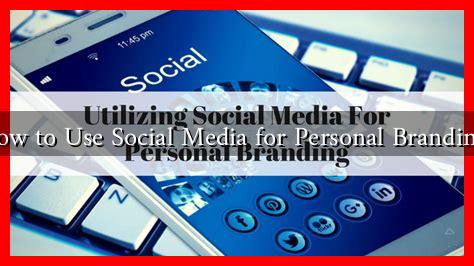-
Table of Contents
How to Use Social Media for Personal Branding
In today’s digital age, social media has become an essential tool for personal branding. Whether you are a freelancer, entrepreneur, or a professional looking to advance your career, effectively utilizing social media can help you establish a strong personal brand. This article will explore strategies for leveraging social media to enhance your personal brand, supported by examples and statistics.
Understanding Personal Branding
Personal branding is the practice of marketing yourself and your career as a brand. It involves defining your unique value proposition and communicating it effectively to your target audience. According to a study by CareerBuilder, 70% of employers use social media to screen candidates before hiring, highlighting the importance of a well-crafted online presence.
Choosing the Right Platforms
Not all social media platforms are created equal, and choosing the right ones is crucial for effective personal branding. Here are some popular platforms and their unique advantages:
- LinkedIn: Ideal for professionals, LinkedIn allows you to showcase your resume, connect with industry leaders, and share professional content.
- Instagram: A visual platform perfect for creatives, Instagram can help you showcase your work and personality through images and videos.
- Twitter: Great for sharing quick thoughts, industry news, and engaging in conversations with thought leaders.
- Facebook: While more personal, Facebook can be used to connect with a broader audience and share longer-form content.
Creating a Consistent Brand Identity
Consistency is key in personal branding. Here are some elements to consider:
- Profile Picture: Use a professional headshot across all platforms.
- Bio/Description: Craft a compelling bio that reflects your personality and professional goals.
- Content Style: Maintain a consistent tone and style in your posts, whether it’s formal, casual, or humorous.
For example, Gary Vaynerchuk, a well-known entrepreneur and social media influencer, maintains a consistent brand identity across all platforms, which has significantly contributed to his success.
Engaging with Your Audience
Building a personal brand is not just about broadcasting your message; it’s also about engaging with your audience. Here are some effective strategies:
- Respond to Comments: Engage with your followers by responding to their comments and messages.
- Ask Questions: Encourage interaction by asking your audience for their opinions or experiences.
- Share User-Generated Content: Highlight content created by your followers to foster community and loyalty.
According to a report by Sprout Social, 64% of consumers want brands to connect with them, emphasizing the importance of engagement in personal branding.
Content Creation and Sharing
Creating valuable content is essential for establishing authority in your field. Here are some content ideas:
- Blog Posts: Share insights and expertise through articles on platforms like Medium or your own blog.
- Videos: Create informative or entertaining videos on platforms like YouTube or Instagram Reels.
- Podcasts: Start a podcast to discuss industry trends and interview experts.
For instance, Neil Patel, a digital marketing expert, uses a combination of blog posts, videos, and podcasts to share his knowledge, which has helped him build a strong personal brand.
Monitoring Your Online Reputation
Regularly monitoring your online presence is crucial for maintaining your personal brand. Use tools like Google Alerts or Mention to track mentions of your name and respond to any negative feedback promptly. A positive online reputation can significantly impact your career opportunities.
Conclusion
In conclusion, using social media for personal branding involves a strategic approach that includes choosing the right platforms, creating a consistent brand identity, engaging with your audience, producing valuable content, and monitoring your online reputation. By implementing these strategies, you can effectively build a personal brand that resonates with your target audience and opens doors to new opportunities. Remember, your personal brand is a reflection of who you are—make it authentic and impactful.
For more insights on personal branding, check out this Forbes article.


